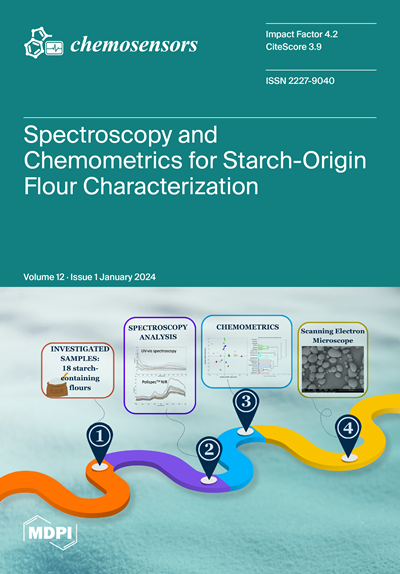Near Infrared and UV-Visible Spectroscopy Coupled with Chemometrics for the Characterization of Flours from Different Starch Origins
IF 3.7
3区 工程技术
Q2 CHEMISTRY, ANALYTICAL
引用次数: 0
Abstract
This work tested near-infrared (NIR) and UV-visible (UV-Vis) spectroscopy coupled with chemometrics to characterize flours from different starch origins. In particular, eighteen starch-containing flours (e.g., type 00 flour, rye, barley, soybean, chestnut, potato, spelt, buckwheat, oat, millet, rice, durum wheat, amaranth, chickpea, sesame, corn, hemp and sunflower flours) were analyzed with a twofold objective: chemically characterizing the investigated flours and laying the groundwork for the development of a fast and suitable method that can identify the botanical source of starch in food. This could ensure ingredient traceability and aid in preventing/detecting food fraud. Untargeted approaches were used for this study, involving the simultaneous acquisition of a large amount of chemical information (UV-Vis on extracted starch and NIR signals on raw flours) coupled with chemometric techniques. UV-VIS spectra were acquired between 225 and 800 nm after sample pretreatment to extract starch. NIR spectra were acquired between 900 and 1700 nm using a poliSPEC NIRe portable instrument on the flours without any kind of pretreatments. An initial exploratory investigation was conducted using principal component analysis and cluster analysis, obtaining interesting preliminary information on patterns among the investigated flours. In particular, the UV-Vis model successfully discerned samples such as potato, chestnut, sunflower, durum wheat, sesame, buckwheat, rice, corn, spelt and 00-type flours. PCA model results obtained from the analysis of NIR spectra also provided comparable results with the UV-Vis model, particularly highlighting the differences observed between hemp and potato flours with soybean flour. Some similarities were identified between other flours, such as barley and millet, rye and oats, and chickpea and amaranth. Therefore, some flour samples underwent surface analysis via scanning electron microscope (SEM) using the Nova NanoSEM 450 to detect distinctive morphology.近红外和紫外-可见光谱法与化学计量学结合用于表征不同淀粉来源的面粉
这项工作测试了近红外(NIR)和紫外-可见(UV-Vis)光谱与化学计量学的结合,以表征不同淀粉来源的面粉。特别是对 18 种含淀粉的面粉(如 00 型面粉、黑麦、大麦、大豆、栗子、马铃薯、斯佩尔特小麦、荞麦、燕麦、小米、大米、硬质小麦、苋菜、鹰嘴豆、芝麻、玉米、大麻和向日葵面粉)进行了分析,目的有两个:对所研究的面粉进行化学特征描述,并为开发一种快速、合适的方法奠定基础,该方法可识别食品中淀粉的植物来源。这可以确保成分的可追溯性,并有助于预防/检测食品欺诈。本研究采用了非目标方法,包括同时获取大量化学信息(提取淀粉的紫外可见光谱和生面粉的近红外信号),并结合化学计量学技术。在样品预处理提取淀粉后,在 225 纳米和 800 纳米之间采集紫外可见光谱。使用 poliSPEC NIRe 便携式仪器对未经任何预处理的面粉采集了 900 至 1700 nm 的近红外光谱。利用主成分分析和聚类分析进行了初步的探索性研究,获得了关于所研究面粉之间模式的有趣的初步信息。特别是,紫外可见光谱模型成功地分辨出了马铃薯、栗子、向日葵、硬质小麦、芝麻、荞麦、大米、玉米、斯佩尔特小麦和 00 型面粉等样品。近红外光谱分析得出的 PCA 模型结果也与紫外可见光谱模型结果相当,尤其突出了大麻和马铃薯面粉与大豆面粉之间的差异。大麦和小米、黑麦和燕麦、鹰嘴豆和苋菜等其他面粉之间也有一些相似之处。因此,使用 Nova NanoSEM 450 通过扫描电子显微镜(SEM)对一些面粉样本进行了表面分析,以检测其独特的形态。
本文章由计算机程序翻译,如有差异,请以英文原文为准。
求助全文
约1分钟内获得全文
求助全文
来源期刊

Chemosensors
Chemistry-Analytical Chemistry
CiteScore
5.00
自引率
9.50%
发文量
450
审稿时长
11 weeks
期刊介绍:
Chemosensors (ISSN 2227-9040; CODEN: CHEMO9) is an international, scientific, open access journal on the science and technology of chemical sensors published quarterly online by MDPI.The journal is indexed in Scopus, SCIE (Web of Science), CAPlus / SciFinder, Inspec, Engineering Village and other databases.
 求助内容:
求助内容: 应助结果提醒方式:
应助结果提醒方式:


